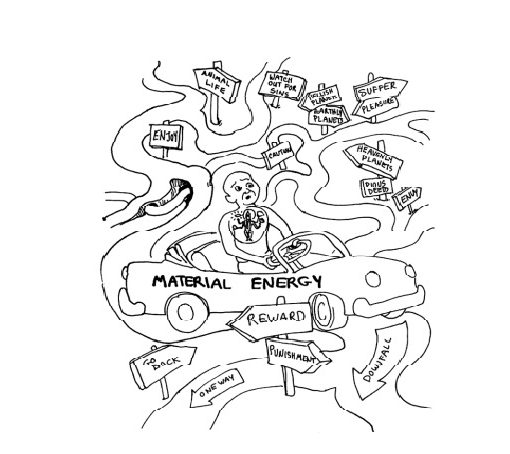jyāyasī cet karmaṇas te
matā buddhir janārdana
tat kiṁ karmaṇi ghore māṁ
niyojayasi keśava
Translation
Arjuna said: O Janārdana, O Keśava, why do You want to engage me in this ghastly warfare, if You think that intelligence is better than fruitive work?
buddhiṁ mohayasīva me
tad ekaṁ vada niścitya
yena śreyo ’ham āpnuyām
Translation
My intelligence is bewildered by Your equivocal instructions. Therefore, please tell me decisively which will be most beneficial for me.
loke ’smin dvi-vidhā niṣṭhā
purā proktā mayānagha
jñāna-yogena sāṅkhyānāṁ
karma-yogena yoginām
Translation
The Supreme Personality of Godhead said: O sinless Arjuna, I have already explained that there are two classes of men who try to realize the self. Some are inclined to understand it by empirical, philosophical speculation, and others by devotional service.
naiṣkarmyaṁ puruṣo ’śnute
na ca sannyasanād eva
siddhiṁ samadhigacchati
Translation
Not by merely abstaining from work can one achieve freedom from reaction, nor by renunciation alone can one attain perfection.
jātu tiṣṭhaty akarma-kṛt
kāryate hy avaśaḥ karma
sarvaḥ prakṛti-jair guṇaiḥ
Translation
Everyone is forced to act helplessly according to the qualities he has acquired from the modes of material nature; therefore no one can refrain from doing something, not even for a moment.
ya āste manasā smaran
indriyārthān vimūḍhātmā
mithyācāraḥ sa ucyate
Translation
One who restrains the senses of action but whose mind dwells on sense objects certainly deludes himself and is called a pretender.
niyamyārabhate ’rjuna
karmendriyaiḥ karma-yogam
asaktaḥ sa viśiṣyate
Translation
On the other hand, if a sincere person tries to control the active senses by the mind and begins karma-yoga [in Kṛṣṇa consciousness] without attachment, he is by far superior.
karma jyāyo hy akarmaṇaḥ
śarīra-yātrāpi ca te
na prasidhyed akarmaṇaḥ
Translation
Perform your prescribed duty, for doing so is better than not working. One cannot even maintain one’s physical body without work.
loko ’yaṁ karma-bandhanaḥ
tad-arthaṁ karma kaunteya
mukta-saṅgaḥ samācara
Translation
Work done as a sacrifice for Viṣṇu has to be performed; otherwise work causes bondage in this material world. Therefore, O son of Kuntī, perform your prescribed duties for His satisfaction, and in that way you will always remain free from bondage.
purovāca prajāpatiḥ
anena prasaviṣyadhvam
eṣa vo ’stv iṣṭa-kāma-dhuk
Translation
In the beginning of creation, the Lord of all creatures sent forth generations of men and demigods, along with sacrifices for Viṣṇu, and blessed them by saying, “Be thou happy by this yajña [sacrifice] because its performance will bestow upon you everything desirable for living happily and achieving liberation.”
te devā bhāvayantu vaḥ
parasparaṁ bhāvayantaḥ
śreyaḥ param avāpsyatha
Translation
The demigods, being pleased by sacrifices, will also please you, and thus, by cooperation between men and demigods, prosperity will reign for all.
dāsyante yajña-bhāvitāḥ
tair dattān apradāyaibhyo
yo bhuṅkte stena eva saḥ
Translation
In charge of the various necessities of life, the demigods, being satisfied by the performance of yajña [sacrifice], will supply all necessities to you. But he who enjoys such gifts without offering them to the demigods in return is certainly a thief.
mucyante sarva-kilbiṣaiḥ
bhuñjate te tv aghaṁ pāpā
ye pacanty ātma-kāraṇāt
Translation
The devotees of the Lord are released from all kinds of sins because they eat food which is offered first for sacrifice. Others, who prepare food for personal sense enjoyment, verily eat only sin.
parjanyād anna-sambhavaḥ
yajñād bhavati parjanyo
yajñaḥ karma-samudbhavaḥ
Translation
All living bodies subsist on food grains, which are produced from rains. Rains are produced by performance of yajña [sacrifice], and yajña is born of prescribed duties.
brahmākṣara-samudbhavam
tasmāt sarva-gataṁ brahma
nityaṁ yajñe pratiṣṭhitam
Translation
Regulated activities are prescribed in the Vedas, and the Vedas are directly manifested from the Supreme Personality of Godhead. Consequently the all-pervading Transcendence is eternally situated in acts of sacrifice.
nānuvartayatīha yaḥ
aghāyur indriyārāmo
moghaṁ pārtha sa jīvati
Translation
My dear Arjuna, one who does not follow in human life the cycle of sacrifice thus established by the Vedas certainly leads a life full of sin. Living only for the satisfaction of the senses, such a person lives in vain.
ātma-tṛptaś ca mānavaḥ
ātmany eva ca santuṣṭas
tasya kāryaṁ na vidyate
Translation
But for one who takes pleasure in the Self, whose human life is one of self-realization, and who is satisfied in the Self only, fully satiated – for him there is no duty.
nākṛteneha kaścana
na cāsya sarva-bhūteṣu
kaścid artha-vyapāśrayaḥ
Translation
A self-realized man has no purpose to fulfill in the discharge of his prescribed duties, nor has he any reason not to perform such work. Nor has he any need to depend on any other living being.
kāryaṁ karma samācara
asakto hy ācaran karma
param āpnoti pūruṣaḥ
Translation
Therefore, without being attached to the fruits of activities, one should act as a matter of duty, for by working without attachment one attains the Supreme.
āsthitā janakādayaḥ
loka-saṅgraham evāpi
sampaśyan kartum arhasi
Translation
Kings such as Janaka attained perfection solely by performance of prescribed duties. Therefore, just for the sake of educating the people in general, you should perform your work.
tat tad evetaro janaḥ
sa yat pramāṇaṁ kurute
lokas tad anuvartate
Translation
Whatever action a great man performs, common men follow. And whatever standards he sets by exemplary acts, all the world pursues.
triṣu lokeṣu kiñcana
nānavāptam avāptavyaṁ
varta eva ca karmaṇi
Translation
O son of Pṛthā, there is no work prescribed for Me within all the three planetary systems. Nor am I in want of anything, nor have I a need to obtain anything – and yet I am engaged in prescribed duties.
jātu karmaṇy atandritaḥ
mama vartmānuvartante
manuṣyāḥ pārtha sarvaśaḥ
Translation
For if I ever failed to engage in carefully performing prescribed duties, O Pārtha, certainly all men would follow My path.
na kuryāṁ karma ced aham
saṅkarasya ca kartā syām
upahanyām imāḥ prajāḥ
Translation
If I did not perform prescribed duties, all these worlds would be put to ruination. I would be the cause of creating unwanted population, and I would thereby destroy the peace of all living beings.
yathā kurvanti bhārata
kuryād vidvāṁs tathāsaktaś
cikīrṣur loka-saṅgraham
Translation
As the ignorant perform their duties with attachment to results, the learned may similarly act, but without attachment, for the sake of leading people on the right path.
ajñānāṁ karma-saṅginām
joṣayet sarva-karmāṇi
vidvān yuktaḥ samācaran
Translation
So as not to disrupt the minds of ignorant men attached to the fruitive results of prescribed duties, a learned person should not induce them to stop work. Rather, by working in the spirit of devotion, he should engage them in all sorts of activities [for the gradual development of Kṛṣṇa consciousness].
guṇaiḥ karmāṇi sarvaśaḥ
ahaṅkāra-vimūḍhātmā
kartāham iti manyate
Translation
The spirit soul bewildered by the influence of false ego thinks himself the doer of activities that are in actuality carried out by the three modes of material nature.
guṇa-karma-vibhāgayoḥ
guṇā guṇeṣu vartanta
iti matvā na sajjate
Translation
One who is in knowledge of the Absolute Truth, O mighty-armed, does not engage himself in the senses and sense gratification, knowing well the differences between work in devotion and work for fruitive results.
sajjante guṇa-karmasu
tān akṛtsna-vido mandān
kṛtsna-vin na vicālayet
Translation
Bewildered by the modes of material nature, the ignorant fully engage themselves in material activities and become attached. But the wise should not unsettle them, although these duties are inferior due to the performers’ lack of knowledge.
sannyasyādhyātma-cetasā
nirāśīr nirmamo bhūtvā
yudhyasva vigata-jvaraḥ
Translation
Therefore, O Arjuna, surrendering all your works unto Me, with full knowledge of Me, without desires for profit, with no claims to proprietorship, and free from lethargy, fight.
anutiṣṭhanti mānavāḥ
śraddhāvanto ’nasūyanto
mucyante te ’pi karmabhiḥ
Translation
Those persons who execute their duties according to My injunctions and who follow this teaching faithfully, without envy, become free from the bondage of fruitive actions.
nānutiṣṭhanti me matam
sarva-jñāna-vimūḍhāṁs tān
viddhi naṣṭān acetasaḥ
Translation
But those who, out of envy, disregard these teachings and do not follow them regularly are to be considered bereft of all knowledge, befooled, and ruined in their endeavors for perfection.
prakṛter jñānavān api
prakṛtiṁ yānti bhūtāni
nigrahaḥ kiṁ kariṣyati
Translation
Even a man of knowledge acts according to his own nature, for everyone follows the nature he has acquired from the three modes. What can repression accomplish?
rāga-dveṣau vyavasthitau
tayor na vaśam āgacchet
tau hy asya paripanthinau
Translation
There are principles to regulate attachment and aversion pertaining to the senses and their objects. One should not come under the control of such attachment and aversion, because they are stumbling blocks on the path of self-realization.
para-dharmāt sv-anuṣṭhitāt
sva-dharme nidhanaṁ śreyaḥ
para-dharmo bhayāvahaḥ
Translation
It is far better to discharge one’s prescribed duties, even though faultily, than another’s duties perfectly. Destruction in the course of performing one’s own duty is better than engaging in another’s duties, for to follow another’s path is dangerous.
atha kena prayukto ’yaṁ
pāpaṁ carati pūruṣaḥ
anicchann api vārṣṇeya
balād iva niyojitaḥ
Translation
Arjuna said: O descendant of Vṛṣṇi, by what is one impelled to sinful acts, even unwillingly, as if engaged by force?
kāma eṣa krodha eṣa
rajo-guṇa-samudbhavaḥ
mahāśano mahā-pāpmā
viddhy enam iha vairiṇam
Translation
The Supreme Personality of Godhead said: It is lust only, Arjuna, which is born of contact with the material mode of passion and later transformed into wrath, and which is the all-devouring sinful enemy of this world.
yathādarśo malena ca
yatholbenāvṛto garbhas
tathā tenedam āvṛtam
Translation
As fire is covered by smoke, as a mirror is covered by dust, or as the embryo is covered by the womb, the living entity is similarly covered by different degrees of this lust.
jñānino nitya-vairiṇā
kāma-rūpeṇa kaunteya
duṣpūreṇānalena ca
Translation
Thus the wise living entity’s pure consciousness becomes covered by his eternal enemy in the form of lust, which is never satisfied and which burns like fire.
asyādhiṣṭhānam ucyate
etair vimohayaty eṣa
jñānam āvṛtya dehinam
Translation
The senses, the mind and the intelligence are the sitting places of this lust. Through them lust covers the real knowledge of the living entity and bewilders him.
niyamya bharatarṣabha
pāpmānaṁ prajahi hy enaṁ
jñāna-vijñāna-nāśanam
Translation
Therefore, O Arjuna, best of the Bhāratas, in the very beginning curb this great symbol of sin [lust] by regulating the senses, and slay this destroyer of knowledge and self-realization.
indriyebhyaḥ paraṁ manaḥ
manasas tu parā buddhir
yo buddheḥ paratas tu saḥ
Translation
The working senses are superior to dull matter; mind is higher than the senses; intelligence is still higher than the mind; and he [the soul] is even higher than the intelligence.
saṁstabhyātmānam ātmanā
jahi śatruṁ mahā-bāho
kāma-rūpaṁ durāsadam
Translation
Thus knowing oneself to be transcendental to the material senses, mind and intelligence, O mighty-armed Arjuna, one should steady the mind by deliberate spiritual intelligence [Kṛṣṇa consciousness] and thus – by spiritual strength – conquer this insatiable enemy known as lust.





